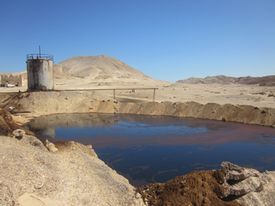Petroleum Concession in the South Will be Resisted!
Over the past few months, there have been rumors of oil concessions being designated in the southern Red Sea. HEPCA would like to make it clear that such concessions will face massive resistance by our network of members, supporters and lobbyists. HEPCA is against any practices that have the potential of harming our environment. Fossil fuels detrimental environmental impacts have been well documented over the years and include: Oil Exploration—Seismic Surveys: Seismic surveys are conducted to locate and estimate the size of an offshore oil reserve. In order to conduct surveys, ships use ‘airgun arrays’ to emit high-decibel explosive impulses in order to map the seafloor. The noise from seismic surveys can damage or kill fish eggs and larvae and impair the hearing and health of fish, making them susceptible to predators and making it challenging for them to locate prey or mates or communicate with each other. Drilling and Processing Oil: The process of drilling releases thousands of gallons of polluted water into the ocean, known as “drilling muds” (containing toxins like benzene, zinc, arsenic, radioactive materials, and other contaminants that are used to lubricate drill bits and maintain pressure). Unfortunately these discharges are largely unregulated. High concentration of metals have been found around drilling platforms in the Gulf of Mexico and have been shown to bioaccumulate in our food chains. A recent study by the PEW Charitable Trust concluded that a single oil well discharges around 1,500 – 2,000 tons of waste material. Contaminants from oil drilling can accumulate on the sea floor, often smothering organisms and causing malformations, genetic damage, and mortality in fish embryos. Oil Spills: Oil spills have the ability to ruin entire ecosystems and can take numerous years to clean up. Onshore Environmental Impacts: Because oil production requires massive infrastructure on land (e.g., roads, storage tanks, pipelines, processing facilities, and other facilities) local communities can experience onshore environmental problems because of offshore drilling. Impacts associated with infrastructure can severely damage beaches, wetlands, and coastal habitats, which directly impact local communities that rely on tourism and recreation. Oil processing plants produce massive air pollution and also utilize large amounts of freshwater to process oil. It is unfortunate that the oil industry is externalizing the costs of the air, water and land pollution at the expense of our environment and tourism. We are asking all of our members to make their voices heard in regards to this critical issue and we will keep you updated with how this story develops. Sources: http://www.beachapedia.org/Offshore_Oil_Drilling#Overview_of_Offshore_Oil_Drilling امتيازات البترول فى الجنوب ستقاوم بعنف خلال الاشهر القليلة الماضية كانت هناك شائعات عن الامتيازات النفطية التى تم منحها فى جنوب البحر الاحمر ، و نود ان نعلن بوضوح ان مثل هذه الامتيازات سوف تواجه مقاومة عنيفة من قبل اعضائنا و مساندينا و تقف جمعية المحافظة على البيئة " هيبكا " ضد أي ممارسات من شانها إلحاق الضرر بيئتنا، و لا شك ان الاثار الضارة على البيئة من الوقود الحفرى معلومة و موثقة جيدا على مر السنين وتشمل ما يلي التنقيب عن النفط تجرى عمليات المسح الجيوفيزيائى لتحديد و تقدير احتياطى النفط بالمناطق البحرية ، و من اجل اجراء هذا المسح ، تستخدم السفن اجهزة تولد اصوات مدوية تستخدم فى رسم خريطة لقاع البحر ، يمكن للضجيج الناتج من المسح السيزمى ( الجيو فيزيائى ) ان يتسبب فى قتل او تلف بيض الاسماك و اليرقات كما يؤثر على حاسة السمع و صحة الاسماك، مما يجعلها عرضة للضوارى او تفقد مهارتها فى البحث عن الطعام او التزاوج او حتى التواصل فيما بينهم الحفر و معالجة النفط تنتج عملية الحفر آلاف الجالونات من المياه الملوثة ، و المعروفة باسم ( طين الحفر ) ، و تحتوى على سموم مثل البنزين ، الزنك ، الزرنيخ و المواد المشعة ، و غيرها من الملوثات التى تستخدم لتليين معدات الحفر . و للاسف فان هذه الافرازات غير منظمة الى حد كبير وعادة ما يكون تركيز المعادن فى محيط اى ارصفة حفر عالى جدا مثل خليج المكسيك ، و قد تبين ايضا ان هذه السموم تتراكم فى سلسلة غذائنا . خلصت دراسة حديثة اجراها صندوق بيو الخيرى ( احد المنظمات الاهلية ) ان منصة بترول واحدة تصرف حولى 1500 الى 2000 طن من النفايات ، و يمكن للملوثات الناتجة من الحفر ان تتراكم فى قاع البحر و فى كثير من الاحيان تتسبب فى اختناق الكائنات الحية ، حدوث تشوهات ، ضرر وراثى ، وفيات اجنة الاسماك تسرب النفط ان التسرب النفطى قادر على تدمير انظمة بيئية متكاملة و التى قد تستغرق سنوات لا حصر لها لتتعافى الاثار على البيئة البرية و لان انتاج النفط يتطلب بنية اساسية ضخمة على ارض ( مثل الطرق ، صهاريج التخزين ، خطوط الانابيب ، وحدات معالجة ، و غيرها من المرافق ...) تواجه المجتمعات المحلية مشكلات بيئية خطيرة نتيجة التنقيب و الحفر داخل البحر. ان التأثيرات المصاحبة لانشاء البنية التحتية تسبب اضرارا جسيمة للشواطئ ، الاراضى الرطبة و الموائل الساحلية و التى تؤثر مباشرة على المجتمعات المحلية التى تعتمد على السياحة و الترفيه. كما ان محطات معالجة النفط العملاقة تتسبب فى تلوث هائل للهواء و تستهلك كميات كبيرة من المياه العذبة فى عمليات المعالجة من المؤسف انها تكلفنا الكثير من تلوث المياه و الهواء و ذلك كله على حساب حساب سلامة البيئة المحيطة و على صناعة السياحة ككل و نحن نناشد جميع اعضائنا الاهتمام بالقضية و بذل الجهد لجعل اصواتهم مسموعة فى ما يخص هذه القضية الحرجة ، و سوف نوافيكم باى مستجدات تخص هذه القضية و اى تطورات قد تحدث مستقبلا المصادر http://www.beachapedia.org/Offshore_Oil_Drilling#Overview_of_Offshore_Oil_Drilling



